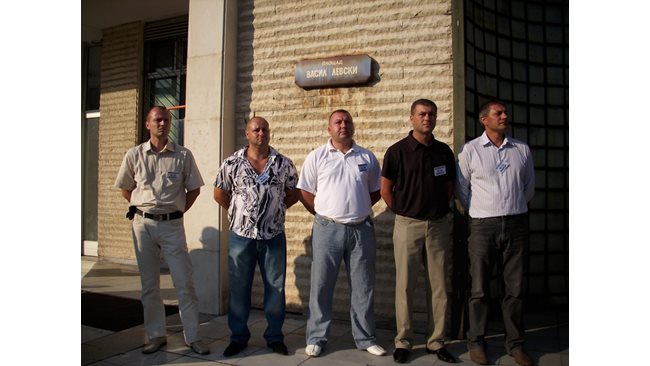
[ad_1]

The five Blagoevgrad policemen, sentenced to 7 years in prison for the death of Angel Dimitrov-Chorata. Photo: Archive
The reason: the statute of limitations for wrongful death has expired
The Supreme Court of Cassation found the defendants in the case of the death of Angel Dimitrov – Chorata guilty of reckless homicide, but due to the expiration of the statute of limitations for criminal prosecution, it did not punish them. This was announced by the Supreme Court of Cassation.
Chorata died during Operation Respect in Blagoevgrad in 2005.
The defendants are the police officers, some of them already ex: Miroslav Pisov, Ivo Ivanov, Boris Mehandjiiski, Georgi Kalinkov and Yanko Grahovski.
The panel of the Supreme Court of Cassation applies the statute of limitations and does not punish them. The magistrates ordered them to pay the costs incurred before the appeal instance for an amount of BGN 1,501.57 for each of them separately, as well as the costs incurred before the SCC for an amount of BGN 1,898 for each of them separately. .
The decision cannot be appealed.
This is what emerges from the motives of the Supreme Justices:
The three-member panel of the Supreme Court of Cassation accepted that the five defendants had committed a reckless murder under art. 122, para. 1 of the Penal Code for inaction.
It was expressed in the fact that after they handcuffed Angel Dimitrov and left him on the ground and after he repeatedly yelled that he was suffocating, they did not take the necessary actions to protect his life.
The general principle of due diligence has been violated, the supreme judges are categorical.
They accepted that the statute of limitations for the criminal prosecution had expired for the crime committed, so the defendants were found guilty by the court, but not punished.
The reasons also indicate that after the defendants accepted the cry of the victim, unequivocally pointing out the difficulty in breathing, which in general endangers life, they were forced, based on the general rule of due diligence, to take all precautionary measures to avoid the occurrence of the socially dangerous result – the death of the victim – for example, putting him on his back or side, straightening him and even removing the handcuffs.
Each of them was able to do so to the extent that there were no objective reasons that prevented it. It is due to their illegal inaction that the socially dangerous outcome has occurred.
The defendants had a real opportunity to prevent death, as is clear from the oral explanations of the experts of the arbitration expertise before the Military Court of Appeals, if in the first stage and until the middle of the second stage of the asphyxiation process. the victim was given the opportunity to breathe, it was possible that death did not occur. The above considerations also corroborate the direct causal link between their criminal inaction and the constitutive result.
The three-member panel of the Supreme Court of Cassation emphasizes that criminal liability as a legal consequence is associated only with that wrongful omission that was committed culpably.
The court held that, on the subjective side, the act was committed in the second form of negligence: negligence.
The characteristic of negligence is the lack of a specific idea of the perpetrator about the possible occurrence of socially dangerous consequences, but for him it was possible to foresee these consequences: he was obliged and could have foreseen them.
The panel of the Supreme Court of Cassation accepted that the defendants did not foresee the occurrence of the socially dangerous consequences, however, they could and were obliged to foresee them. “On the one hand, this is due to the fact that the victim has repeatedly indicated, throughout the process of his arrest, through his screams a respiratory problem, which by its nature, in any situation should not be underestimated.
The defendants did not show due care and attention to such an extent that they neglected the obvious to everyone else in the same situation. They heard the cries of the victim Dimitrov that he could not breathe and perceived the peculiarities of his figure, that is, overweight, that is, they could objectively perceive with their minds all the facts and circumstances necessary to predict the constitutive consequences, and indeed They had the necessary time (Dimitrov repeated that he could not breathe from the beginning of his arrest) for these thought processes to take place, which would lead to the prediction of the result and the possibility of choosing their behavior.
Therefore, the defendants had an objective opportunity to predict the socially dangerous consequences, “the decision reads. The three-member panel of the Supreme Court of Cassation emphasizes that the defendants are police officers specially trained to carry out police actions to detain people who have been instructed on the safety rules during detention According to the supreme judges, the defendants acted in conditions of independent complicity in the result.
Each of the five perceived the cries of the victim that he was suffocating, as well as his physique, so he could and should have foreseen that after being placed on the floor face down and with handcuffs on his back, death could occur . does not take steps to protect your life.
[ad_2]